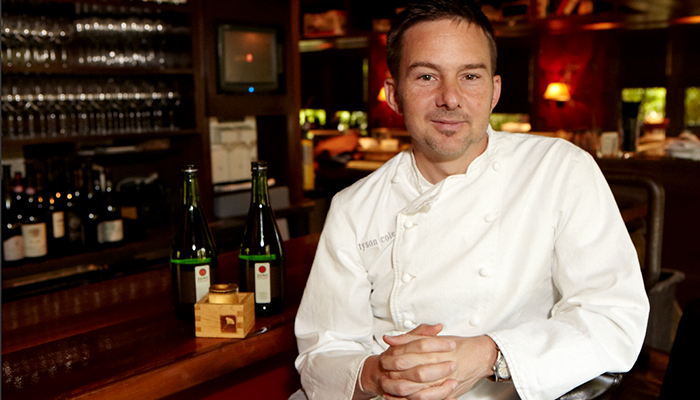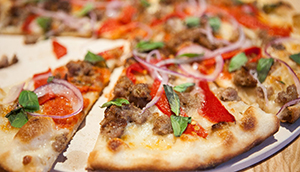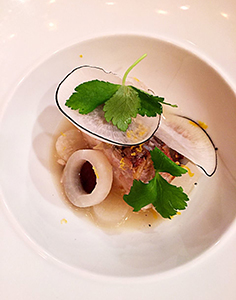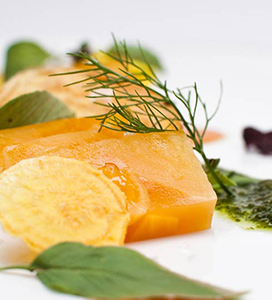
After enjoying a meal at Uchi or Uchiko in Austin, it will likely come as no surprise that executive chef and owner Tyson Cole has a background in art. Each dish not only bursts with deliciously unexpected flavors, but every inspired creation is artfully composed. And watching Cole, who used to dabble with inks and acrylics in his spare time, realize edible masterpieces with quick, dexterous movements of his knife is like seeing a painter at work.
“The chances are the beauty,” Cole says. “There are so many chances with food. That’s why I quit painting — you don’t get any chances. You paint it, you put it on the wall and it just looks at you. And I want to change it so bad. Food’s much better. Food’s very forgiving.”
The colorful Uchi and Uchiko have developed a reputation for being a training ground for some of Austin’s most talented chefs. While Cole is best known for discovering and mentoring Top Chef season 9 winner Paul Qui, there are other Uchi alumni in kitchens all over the city, such as Casey Fannin (chef/owner Fork & Taco), Zach Hunter (chef de cuisine at Fixe) and Sarah Prieto (pastry chef, Counter 3. Five. VII), to name just a few.
Twelve years after the opening of his first restaurant, Cole is busier than ever. His Austin restaurants have grown to three (St. Philip Pizza Parlor and Bakeshop opened in October); the first Uchi outside of the Texas capital opened in Houston in 2012; and one will come to Dallas this spring. Even with all of that on his plate, though, the culinary guru still took the time to sit down and chat with us about his methods of creative collaboration, the instant gratification technology allows us and the three biggest food critics who happen to live with him.
What does a normal day in the life of Tyson Cole look like?
We have three little girls, but I’m usually up latest. I’m more of a night person. So, I get up, shower, usually work out every morning and then, after that, every day changes up depending on the day of the week. We have all kinds of meetings and tastings and, in the daytime, there’s always something going on because there’s so many concepts, so many restaurants and new ones we’re working on. That’ll play out until about mid-afternoon, when I make my way back home and end up making dinner for our kids or my wife will. Then, four or five days a week after that I’ll come work either here [at Uchi] or at Uchiko. That’s most of the time. There’s traveling sometimes, but mostly I’m just here in Austin.
What is it like raising three kids while being executive chef/chief of operations of such a major restaurant group?
It’s pretty crazy. It’s crazy because I have all girls. Girls are a mile a minute and incredibly dramatic. I always joke they’re either laughing or crying all the time. I’m used to it now. It’s fun. Keeps you alive.
What do they like to eat?
All three of them are incredibly different. One of them likes very regular stuff — pizza and chicken and things that are earth tones. The other one likes everything adventurous — all different colors, all different fruits. It’s challenging, cooking for all of them simultaneously. They’re really, really picky, too. I guess I am and my wife [Rebekkah] is too.
Your biggest critics are at home then?
Yes, exactly.
In what ways has Austin’s food scene changed through the years?
Well, there didn’t used to be a food scene. It’s hard to talk about it from my perspective because I don’t really want to put it out there like we were a part of starting it, when Uchi opened in ’03 — but I kind of feel like we did. Before that, there was nothing south of the river, and we decided to do something very Austin — not be pretentious, something that’s accessible — and take sushi somewhere where regular people would try it. And in ’03, again, we were very worried about being Austin-style, which, to us, was casual and not fancy, non-pretentious and having multiple small plates where everything is shared. And it’s quite ironic that now, a decade later, that’s what everyone’s doing. So, I think it’s similar to what we’ve always done, but I think it’s pretty rad to see that happening. I don’t think it’s just Austin-centric —I think it’s everywhere.
And, lastly, it’s amazing for us, as a restaurant group, to have all the talent that’s moving here. There’s so many talented people. I don’t know if there will ever be a more vibrant time in Austin as far as restaurants go because it is so kinetic — so much talent and so many people moving here and everybody’s trying to do the next best thing. Right now, it’s all about the new. That’s what people live for — especially the young people. It’s exciting, all these things happening, and I’m glad to be a part of it.
And though Uchi and Uchiko are by no means new, you’re still just as popular as when you opened.
The way we get around that is we try really, really hard. We look at ourselves every day, taste everything every day and try to improve every day. It’s not just the food but the people, the processes, the standardization of things and making sure that, if you have a core dish or a daily dish that changes, that it’s at that level every single time. Because that level of excellence is what we’re already known for, but once you’re at the top of that heap, you can’t slip. So, we really try hard to make sure we stay there.
The challenge is not in making incredibly delicious food, but it’s in making delicious food consistently. Because that’s way harder. This is a pet peeve of mine — restaurants will take the day off. It’s usually Sunday or Monday. They know it’s going to be slower, so they understaff; they have one less host, two less servers, two less cooks. And you eat there and the food’s not as good, it takes longer. Whereas, in reality, if a place is slower, the food should be better. They’re trying to cut corners to save money, but saving money that way is self-defeating. You should never go in that direction. You always have to execute. As long as you execute and people have a great experience, they’ll come back and they’ll tell their friends. But one bad dish and you’re done.
How do you decide on the dishes for the daily and core menus?
Half our menu is permanent and half is daily. We work on each restaurant for two or three weeks at a time and all the chefs come up with eight to 10 dishes. We taste them all and then we decide. They make changes, refine them, edit them or they say, “You know what? That’s not a good dish. We’re not going to use that.” And then we put the final dishes on the daily menu. Sometimes it’ll be two, sometimes it’ll be eight. It just depends. And after that, we’ll see how we can get the product in and if it’s going to stay consistent and what the guest feedback is. Every dish on our permanent menu was, at one time, on our daily menu. It’s like a list of all-star dishes.
So, going into Houston and Dallas, we’ll come up with dishes that we think will fit best with the concept and pick from those. Then, on the other half of the menu, we’ll let the chefs have some creative freedom and see what’s in season and we’ll work from that. It’s a really fun way to get people involved. I never want to work in a restaurant that has one menu. I think the staff doesn’t, either. If you come to work every day and it’s “time to make the doughnuts,” after a month or two, you say, “Screw the doughnuts. I want to go somewhere fun.”
How else do you plan to expand the Uchi regime?
I don’t think we’d ever go to a big, big city. I think we’ll probably stick to second-tier markets, smaller cities. We’ve looked a little bit out of state. I think eventually we’ll open an Uchi somewhere else. We’ve looked in Denver a couple times. But I think we’re going to focus on this new concept that we’re opening on South Lamar; it’s basically Uchi doing Southeast Asian food. [Editor’s Note: Cole wouldn’t offer any additional details on the upcoming restaurant.]
The only reason we ever did a second restaurant was because of the people. I would’ve never opened Uchiko if we didn’t have the people to do it. We’re growing these people that were with us for so many years and they love what we do. It’s almost like kids going away to college and having this tiny family and everyone being like, “What’s next? What’s next?” We were going to lose people unless we did something else. And that’s how the idea of Uchiko came up. And that continues.
What food trends do you think we’ll see more of in 2015?
People want easy. They want accessible. They want convenience. That’s how everybody eats now. They want that immediate gratification, especially millennials who seem to be running everything right now. Their style of life seems to be what’s determining everything. And people are all trying to buy into that mentality, so people are developing various types of apps, electronics and technology that are going to provide that. It’s cool to be a part of, to watch that happen. I think it’s interesting when you combine the food, the styles of food and things really going in more of a fast-casual direction. And that’s been spurred a lot by the success of food trucks and stuff like that.
Now the challenge is taking that kind of style of service and that kind of food and putting it in a different setting, where it’s just as accessible and just as easy. I think that, again, technology’s going to help with that. People don’t like slow anymore, including me — I hate it. What’s weird is that people are so into that immediate gratification now, yet they’ll stand in lines and wait for things that are good. It’s the cool factor. It’s not uncool to wait in line. They get on their Facebook, Twitter or whatever and tell the whole world, “I’m in line waiting!” Whereas me? No way I’d ever wait in a line like that. It’s kind of an oxymoron — it’s not fast food anymore. But I feel like someone’s going to figure out a way to bridge that gap. I’m sure they will. I hope we do.
View the full list of official 2015 Forbes Travel Guide Star Ratings here.




